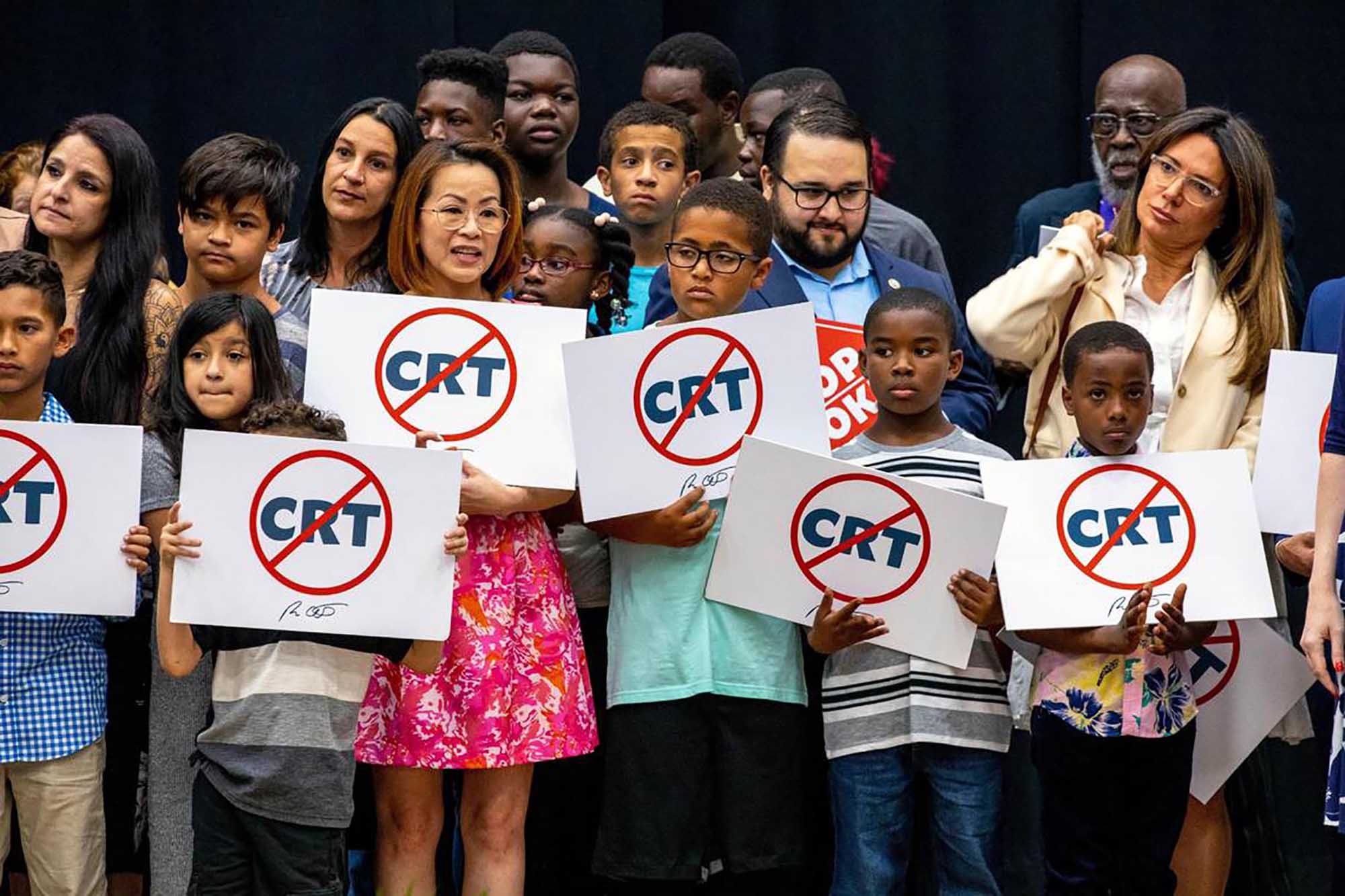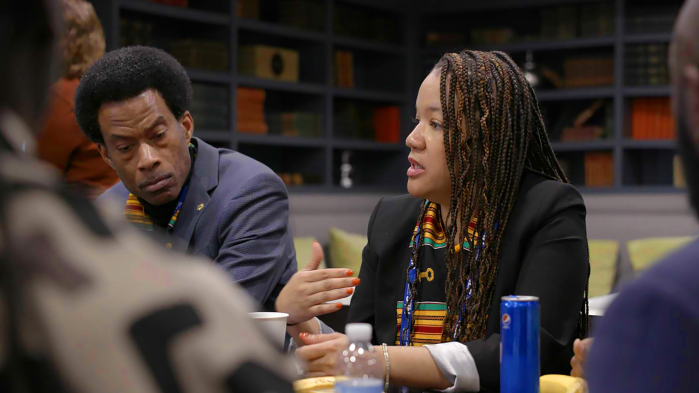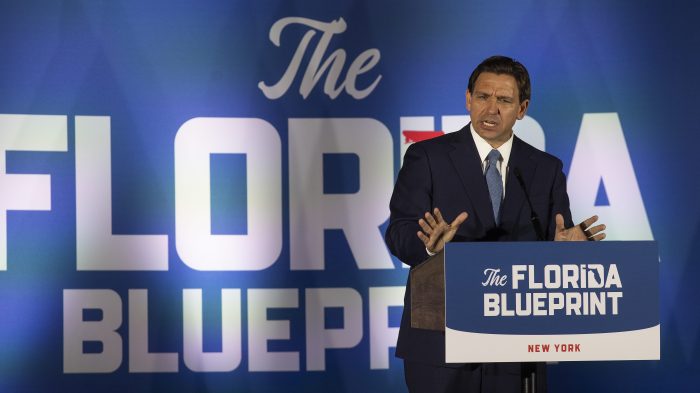“In Florida, we affirm the fundamental role that parents have in the education, health, and development of their children.”
That’s how Gov. Ron DeSantis framed his crusade against all things “diversity” in Florida. It’s because of parents that he recently signed legislation barring public colleges and universities from using state money for diversity, equality, and inclusion (DEI) programs. And he kept those same parents in mind when he rejected an Advanced Placement African American Studies course for his state’s high school students.
But which parents?
Do Black parents in Florida feel DeSantis and Republican members of the state legislature keep them in mind when crafting legislation?
“Absolutely not,” said Tiffany K. Bain. Bain, a mother of one and a lifelong Floridian, believes the DeSantis administration intentionally ignores her and other Black parents for political gain. “I don’t feel included at all. That [parents]dog whistle isn’t for the Black parents.”
Florida’s Stop WOKE Act marshals students past our racial historyRead now
Starting with George Floyd’s murder, several moments over the last three years brought demands for changes in race relations. While educators grappled with the fact that lesson plans omitted moments like the tragedy in Tulsa, Oklahoma when white rioters turned that town, and its Black wealth into ash and distant memories, DeSantis made public schools the center of a culture war.
He used Critical Race Theory, a framework not utilized in elementary or high school, as a scare tactic for parents with children in elementary or high school. He made it easier for Florida school districts to ban books like The ABCs of Black History and several other titles written or illustrated by African Americans. The state cracked down on what teachers can and can’t teach when it comes to race and created fearful educators who abstain from any racial discussion in their classrooms because they don’t know what will or won’t get them fired.
Journalist Nikole Hannah-Jones appeared on an episode of Meet the Press as the country debated how young is too young to teach kids about race and racism. Hannah-Jones noted that moderator Chuck Todd framed the debate as “parents” on one side and “parents of color” on the other, telling him that “white” is silent when he says “parents.”
The world those parents experience matters as it’s wholly different from their white counterparts.
That points to a reflex in the political ecosphere to, once again, push Black parents and Black perspectives into a separate section and minimize their voices. It also obfuscates the fact that Black parents don’t often have time on their side when deciding how young is too young to talk to their kids about race; the world chooses for them. Whether through personal experience or the sheer volume of Black women and men seen being killed on television simply because they exist, those conversations force themselves into their lives. The world those parents experience matters as it’s wholly different from that of their white counterparts. Who represents them when DeSantis rails against teaching about race and America’s complicated and often ugly history on the subject? Do they have a voice when the state denies students access to an optional AP African American Studies class that it says “lacks educational value”?
Yes and no.
Bain points to people like state Senator Shervin Jones (D-Miami-Dade) as someone “fully committed to making sure the voices of Black parents are heard and considered.” But she noted that Republicans control the state legislature by such a large margin that Jones and like-minded politicians often find their arguments falling on intentionally-deaf ears.
Justin Brown, a father of two and a Florida resident since January 2020, said the educational experience in Florida is “very white-centered” and the recently passed bills will cement that fact for years to come while doing a disservice to Black students and their parents.
 Schoolchildren holding signs against the concept of critical race theory stand on stage alongside Florida Gov. Ron DeSantis as he addresses the crowd before signing HB 7, titled the Individual Freedom bill but also dubbed the Stop Woke Act, during a news conference at Mater Academy Charter Middle/High School in Hialeah Gardens, Florida.
Schoolchildren holding signs against the concept of critical race theory stand on stage alongside Florida Gov. Ron DeSantis as he addresses the crowd before signing HB 7, titled the Individual Freedom bill but also dubbed the Stop Woke Act, during a news conference at Mater Academy Charter Middle/High School in Hialeah Gardens, Florida.
Daniel A. Varela/Miami Herald/Tribune News Service via Getty Images
“DeSantis is taking away an opportunity for parents who think it’s important that their children understand race as it relates to our country’s history. He’s pulling race out of the equation for white comfort and as a tool to erase Black identity in the state,” said Brown. “We’ll see the true effects down the line but some are visible today. Education is supposed to be a tool against racism but without it, a lot of white kids in my county [Orange County] bring their parents’ ideology into the classroom. When my daughter was four or five years old, some kids told her they can’t play with her because she’s too brown. She’s was bringing that home at a very young age.”
If a child that young experiences racism from her classmates, that means some of those same parents who believe their kids are too young to learn about race in the classroom clearly have no problem teaching them about it at home. And as Brown pointed out, policing how we talk about race in schools, or eliminating the subject altogether, means those parents’ views go unchecked.
 ‘The Big Payback’ in Evanston shows that reparations are possibleRead now
‘The Big Payback’ in Evanston shows that reparations are possibleRead now
This is why the NAACP issued its travel advisory and called Florida “openly hostile” toward African Americans. Floridians now live in a world that gives one white parent in any county enough power to make a change that causes a ripple effect across the whole state. Brown believes those same rights and privileges don’t apply to him. In fact, he says racism is so emboldened in the state that speaking out against these laws becomes a dangerous proposition. “White people have a permission structure down here, thanks to the loose gun restrictions and the stand-your-ground law, to enact violence if they feel threatened, even through a conversation,” he said.
So what’s the solution? Some Black parents in Florida, including Bain and Brown, believe it’s now on them to teach Black history to their children. But even teaching the value of Black identity isn’t enough, said Brown as he and his wife think about the future they want for their children.
“Florida isn’t the long-term solution for us. I refuse to force my children to grow up in an environment where the only thing they know is they have to fight for their identity. There’s an erasure of Black identity at the core of all of this, and that hostility toward us isn’t something I want for my kids,” said Brown.
These parents don’t believe their children have a future in Florida. They see laws constructed without their input while they must shoulder the burden that comes from living in a state that says their children matter less than someone else’s. Of all the “fundamental” roles parents play, none of that should be in the job description.
Marcus Shorter is a communications professional and writer. When he’s not scribbling thoughts for Consequence, Cageside Seats or Bloody Disgusting, he’s getting extra nerdy about rap lyrics, politics, poetry and comic books.



